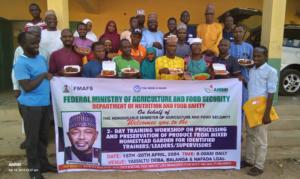In the fourth quarter of 2024, the Federal Ministry of Agriculture and Food Security (FMAFS) through strategic collaborations, capacity-building initiatives, and community-driven projects, made significant strides in promoting sustainable agricultural practices and improving the nutritional status of vulnerable populations.
NCFN Collaboration and Support
FMAFS actively participated in the National Committee on Food and Nutrition (NCFN) by providing relevant nutrition data during quarterly meetings. This contribution enriched the nutrition information and food systems dashboard, facilitating informed decision-making. Additionally, the Ministry supported the successful conduct of NCFN Secretariat’s quarterly meetings, reinforcing its commitment to multi-sectoral coordination in addressing malnutrition.
 Aligning with the Performance Management System (PMS), FMAFS contributed to policy formulation, notably the National Agriculture Technology and Innovation Policy (NATIP), supporting the implementation of the President’s Renewed Hope Agenda for the agriculture sector. The Ministry provided monthly reports on program and policy implementation, tracking progress towards national agricultural goals.
Aligning with the Performance Management System (PMS), FMAFS contributed to policy formulation, notably the National Agriculture Technology and Innovation Policy (NATIP), supporting the implementation of the President’s Renewed Hope Agenda for the agriculture sector. The Ministry provided monthly reports on program and policy implementation, tracking progress towards national agricultural goals.
To strengthen PMS implementation, FMAFS conducted in-house capacity-building sessions for staff within the Nutrition and Food Safety Department. Staff members signed performance contracts, and the Ministry played a significant role in monthly data collation, ensuring compliance and accountability.
Core Nutrition Interventions
Under the Accelerating Nutrition Results in Nigeria (ANRiN) project, FMAFS implemented several interventions in Gombe State:
- Distribution of Agricultural Inputs: Provision of starter packs to ANRiN beneficiaries in three LGAs of Gombe State to empower vulnerable households in establishing homestead gardens, thereby ensuring household food and nutrition security.
- Training of Trainers (ToT) Workshops: Conducted workshops on processing and preservation of produce from homestead gardens for ANRiN beneficiaries, equipping them with skills to manage their gardens effectively.
- Step-Down Trainings on Produce Processing: Master Trainers conducted step-down training sessions for project beneficiaries at the community level, focusing on produce processing and food preservation techniques. These trainings were complemented by the distribution of input support in the form of starter packs. It targeted vulnerable households, equipping them with the knowledge and resources needed to establish backyard or homestead gardens.
- Advocacy Visits for Project Sustainability: Undertook a five-day joint advocacy visit to Gombe State to secure the buy-in of relevant stakeholders, ensuring the successful implementation and sustainability of the ANRiN project.
- Monitoring and Evaluation: Monitored the ANRiN project across three LGAs in Gombe state to assess the performance of homestead gardens and determine the achievement of project goals.
- Recognition of Outstanding Performance: To encourage excellence and promote healthy competition among project participants, awards were presented to nine (9) outstanding ANRiN project beneficiaries across the three LGAs in Gombe State.
Success Stories and Best Practices
The ANRiN project positively impacted approximately 600 vulnerable households across the three LGAs in Gombe State. Beneficiaries established homestead gardens, improving household food security and generating income through the sale of surplus produce. Notably, the project’s ethos of “Produce, Eat, and Share” encouraged beneficiaries to share resources with neighbors, extending the benefits beyond direct participants.
Research and Innovation
An innovative practice emerged from the field: the repurposing of condemned insecticide-treated mosquito nets to protect homestead gardens from pests. This low-cost solution enhanced crop protection and demonstrated the ingenuity of local farmers in adapting available resources to improve agricultural outcomes.
Nutrition Funding News
In 2024, the World Bank allocated $250 million to FMAFS under the ANRiN project, bolstering efforts to combat malnutrition and enhance food security through targeted interventions and capacity-building initiatives.
Upcoming Events and Initiatives
FMAFS has outlined several key activities for the upcoming period:
- Training state actors on operationalizing the Food Systems Dashboard.
- Reviewing and updating indicators for the Food Systems Dashboard.
- Providing training and support for the cultivation and marketing of bio-fortified crops among vulnerable groups.
- Distributing customized nutrition input starter packs of bio-fortified crops to vulnerable households.
- Training young farmers on Good Agricultural Practices (GAP), home economics, and nutrition across selected geopolitical zones.
- Facilitating the establishment of Young Farmers’ Clubs in schools to promote food systems transformation.
- Promoting the “Every Home a Garden” initiative nationwide to enhance food and nutrition security.
To sustain critical nutrition programmes, the FMAFS recommends more funding and early releases to complement support of donor partners
